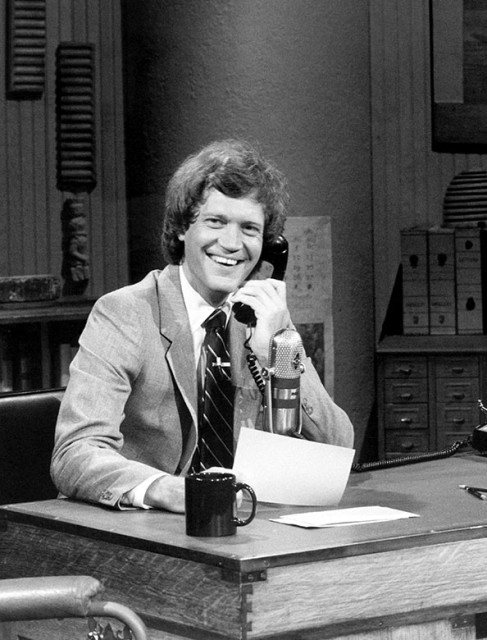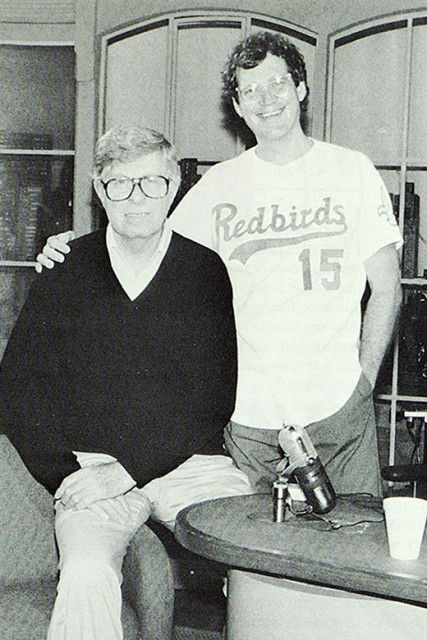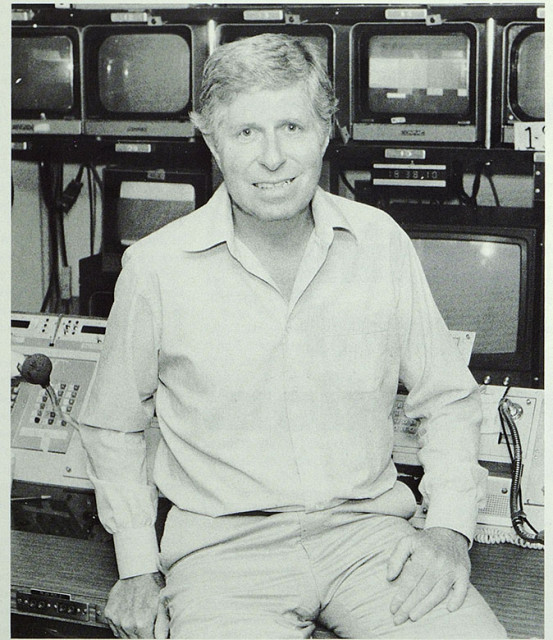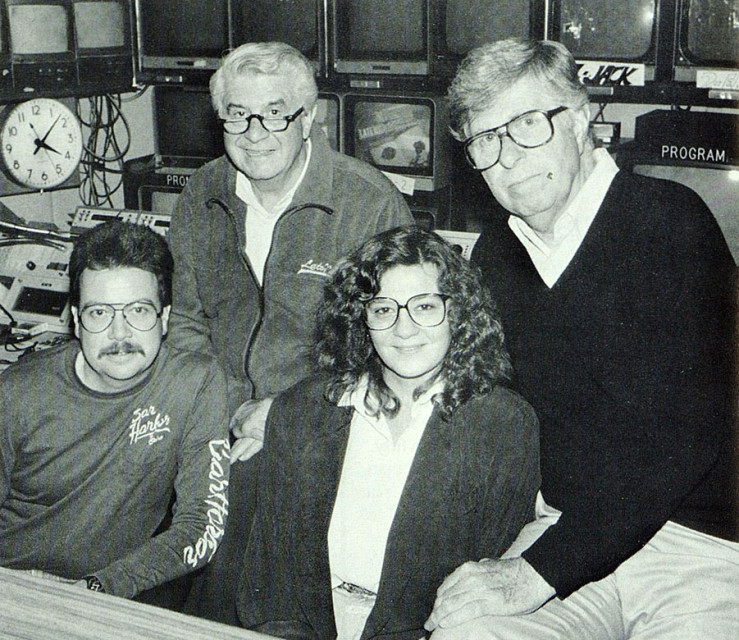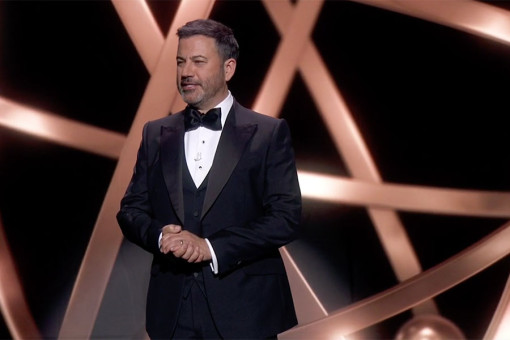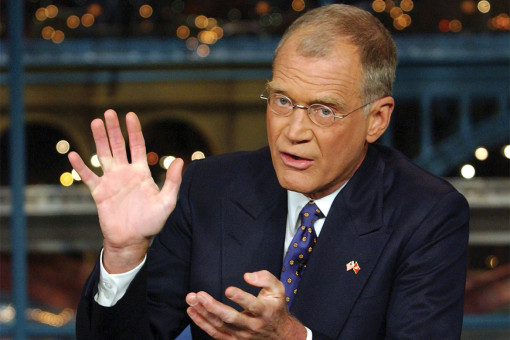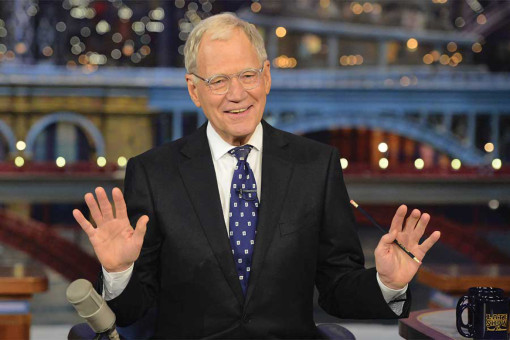David Letterman laid the blueprint for many a stand-up comedian and modern Late Night host to come — Conan O'Brien, Jimmy Fallon and Seth Meyers have all credited the comic as an inspiration. Next week, his talk show Late Night with David Letterman, which launched on February 1, 1982, and ran for 11 years celebrates its 40th anniversary. (Late Night with Seth Meyers will mark the occasion on Tuesday with a special guest appearance by Letterman himself.)
Here we revisit a 1988 emmy magazine interview with director Hal Gurnee, who is credited with directing 301 episodes of Late Night and 174 episodes of Letterman's next talk show, Late Show with David Letterman.
By the time Gurnee arrived at Late Night he was already an experienced director who had racked up credits on The Tonight Show Starring Jack Paar, The Jack Paar Program and Jack Paar Tonite. He also directed episodes of The Tonight Show in the interim period between the departure of Paar and the arrival of Johnny Carson, when the guest hosts included Groucho Marx, Merv Griffin and Art Linkletter.
Gurnee's lengthy working relationship with Paar — which included a distressing experience producing a segment at the site of the Berlin Wall, recounted below — prepared him for any antic Letterman could throw his way.
In this excerpt writer Arnold Mann visits the set of Late Night and goes behind the scenes with Gurnee on episode 934, featuring singer Tom Jones, actress Jami Gertz and humorist Art Buchwald.
Wednesday, October 28, 1987, Studio 6A, NBC, New York:
"Okay, camera one, tighten on Dave."
Here at 30 Rockefeller Plaza, director Hal Gurnee of Late Night with David Letterman is better known to the crew as Hal "Gertner." It all started when Letterman received a thank-you note from one of the show's guests, with particular thanks directed to "Mr. Gertner." He's the sandy-haired, self- effacing fellow in the blue oxford shirt, khaki pants and loafers. You might remember the time his wife left him on national television to marry the Late Night host during an opening skit.
"Camera two, keep your two-shot. That's good. Hold it."
Gurnee hadn't intended to go into television. A Dartmouth liberal arts graduate with a major in psychology, he happened to wind up as a production assistant at the old DuMont network in the late fifties after a brief stint in advertising — in the mail room at Dancer, Fitzgerald and Sample in New York.
When DuMont sold out to Metro media, Bobby Quinn, then associate director on The Jack Paar Show and now director of The Tonight Show Starring Johnny Carson, got Gurnee a job at NBC in the operations department. When Quinn resigned, Gurnee became assistant director on the Paar show. A year later Paar made him a director. Not bad for a twenty-four-year-old.
"I was lucky," Gurnee says. "And my personality seemed to work with what Jack expected in a director. I stayed out of his hair. I kind of guessed what he wanted to do. I like the person out at the desk to feel I can read his mind. You might call it television intuition."
Not bad for a psych major.
Gurnee attributes the onstage-off-stage look of Late Night to That Was the Week That Was, a weekly comedy/variety series he directed in the mid-sixties in which the set was the studio itself. But you might say that for Gurnee, the unfettered spontaneity night owls know as Late Night — complete with monkeys strapped with cameras running loose through the set and the studio audience, "Stupid Pet Tricks," man-on-the-street cutaways and resident dotard Larry "Bud" Melman — was inspired nearly thirty years ago at the Berlin Wall.
"It was around September 1961," Gurnee recalls, "just when the wall went up. And Jack [Paar] decided we should be there.
"At first we took a kind of surrealistic approach from our studio in Berlin. We had shots of people jumping over the wall, and in the next spot we had a musician called Crazy Otto playing the piano.
"Then Jack decided we should get out of the studio and go to the wall. So the unit manager and I talked to the army colonel in charge of Checkpoint Charlie. We told him we needed somebody like him and a few privates for Jack to talk to, and maybe a Jeep. And the guy said, 'How about a weapons carrier?' And we said all right.
"The next day we went out with our mobile unit. And we had a cameraman up in a cherry picker to look over the wall at the East German troops. The problem was that we had picked a time when the Americans were changing the garrison. With all the vehicles coming and going, it looked very ominous.
"Right in the middle of Jack's opening remarks, the East German police brought in a water cannon — one of these great big tanks they use for crowd control. They saw our troopers coming in and the guy in the cherry picker going up, and they didn't know it was a television show.
"About an hour later, after everything had settled down, we went back and did the show.
"When we got the tape back to New York and put it on the air, it created an enormous amount of controversy. The next day on the Senate floor they were saying, 'Who is this entertainer and why is he allowed to go to Berlin and create a situation with the Russians?' The American colonel who helped us was shipped out in disgrace.
"The real story eventually came out in the New York Times, and the colonel was reinstated. But for two or three days people were talking about Paar, Berlin and the Third World War."
Gurnee stayed with Paar from 1960 to 1965, through The Jack Paar Show and the subsequent weekly Jack Paar Program. He's worked talk shows ever since: The Joey Bishop Show, The Jimmy Dean Show, The Garry Moore Show, The David Frost Show and now Late Night with David Letterman.
Gurnee has been directing the Letterman show here in Studio 6A since 1981.
"We did Paar's primetime show out of 6B," the director recalls. "When we moved across the hall here to 6A for a couple of weeks, it threw Jack completely off because the studios are mirror images of each other and everything's reversed. He hated it."
No doubt Gurnee would have found a way to create his cachet pandemonium had this situation presented itself on Late Night. Like the behind-the-scenes non sequiturs that characterize the show.
"I love to swing the cameras around and see the man holding the cue cards," Gurnee says. "It's a style that certainly works five nights a week. You can shoot everything.
"On one occasion, someone being interviewed said, 'My manager said I shouldn't talk about that,' and I sent a camera into the greenroom where the manager was watching on the monitor and we caught his reaction.
"Another guest brought his record producer onto the set. He was standing over by the band. Dave said, 'Who's that guy?' and got up and threw him out of the studio. We shot the whole thing. The audience got a big kick out of it. That's what makes the show fun for me.
"Sometimes I'll even cut to another show. A few weeks ago someone who had refused to come on our show was on Live at Five, the local news show. We cut to her and said, 'There she is. Why isn't she on our show?' It's really strange. You're piggybacking somebody else's show. People could demand payment, I suppose, but they're cool about it. And they enjoy getting the network exposure."
Gurnee continues. "One night Dave decided at the last minute to end the show in the control room. We didn't find out about it until we heard over the SA [studio address system]: 'He's coming into the control room!'
"Sitting next to me at the time was Larry 'Bud' Melman — the little nerdy guy, you know? We thought it would be funny if we put him in my seat and made it look like he was directing the show. And Dave came in and started talking to him, and Melman just sat there saying 'hubba, hubba, hubba...' Dave finally said some swear word and walked out. It was a disaster.
"But we put it on the air. We looked at it and thought, 'Well, we can fix this or cut this,' and Dave just looked at it and said, 'Oh, leave it on.' It was awful, but it looked real. We've topped that since."
"Like when we did Christmas in July," says associate producer Jude Brennan, who has arrived for today's taping. "The big payoff at the end was Larry 'Bud' reading ''Twas the night before Christmas' to a group of children. I thought the poem was on cue cards, and the other PA [production assistant] thought we were getting him the book to read. They ended up just getting him a prop book, which was actually a French catechism. So he sits down, opens the book, and there're no cue cards. And he stammers."
Gurnee interrupts. "I'm shouting, 'Cue him to read! Cue him to read!'"
"Finally," Brennan continues, "Hal comes over the SA and says, 'Go ahead, Larry 'Bud',' and he starts to make up the poem. He keeps stammering and saying things like, 'As I was saying...' and then he'd start over again with ''Twas the night before Christmas...' It just went on and on."
"We were all convulsive," says Gurnee.
"I thought I was going to be fired," says Brennan. "But I couldn't stop laughing. Finally he ended with, 'And that was Christmas.' The kids were totally bewildered. And Hal got all these great shots of them poking one another."
"And licking the wrapping on their gifts."
"And then we came back to Dave, and he said, 'That was magic, wasn't it?'"
Gurnee groans. "It was awful."
Tonight, Late Night number 934, Tom Jones is here to sing the introduction to Letterman's "Supermarket Finds" bit — a sampling of products with stupid labels. Then there's World Series star first baseman Kent Hrbek of the Minnesota Twins; actress Jami Gertz; Late Night researcher Bridget Jackson, whose kid sister is up for homecoming queen in Lafayette, Louisiana; and humorist Art Buchwald.
"It's a very simple show tonight," Gurnee says. "No sketches and no complicated camera moves. It'll be an easy night — unless something goes wrong."
Onstage announcer Bill Wendell is preparing to open the show. Offstage Gurnee is calling directions to the four cameras, and associate director Peter Fatovich is calling the cues.
"Ten, nine, eight, seven, six... and tape roll... five, four, three, two, one... music... stand by the announce mikes... "
Wendell: "FROM NEW YORK, WHERE I'M MAKING THIS ANNOUNCEMENT WITH THE HELP OF PRODUCTION ASSISTANT BARBARA SHEEHAN, IT'S LATE NIGHT WITH DAVID LETTERMAN..."
Gurnee: "Open the doors... dissolve to..."
We're off, with Letterman apologizing for having said nasty things about Oprah Winfrey the previous night.
Fatovich: "Two minutes..."
Gurnee: "....take two... take three..."
Tom Jones launches into the "Supermarket Finds" theme song, and with Letterman rummaging through a bowl of cat food for a diamond, we go to a commercial. Gurnee seems preoccupied with one of the studio monitors, which is showing an exterior shot of Forty-ninth Street.
"I'm stealing a shot from one of the outside feeds," he explains. They're probably using it for a weather shot. I'll use it another time. One week a local newsman was in New Haven for a trial, and we cut to him every night waiting there on the courthouse steps. Just standing there in his raincoat. We're not supposed to do that, but..."
"Right," Fatovich remarks. "Don't do that anymore, Hal... Ten seconds..."
Onstage Letterman has moved from Hrbek to Gertz, who is here to pitch her new movie Less Than Zero.
Letterman: "You look great."
Gertz: "Well, thank you. You look pretty festive yourself."
Fatovich: "Two minutes..."
Gurnee: "...take two... take one... take three..."
Letterman: "What part of the country are you from?"
Gertz: "I'm from Chicago."
Letterman: "Chicago is a great town."
Gertz: "Chicago is the best."
Fatovich: "Okay, let's do the commercial."
"Sometimes it's more effective to see the person's face when the question's being asked than to hear the answer," Gurnee says. "Because sometimes you read something in the eyes that you don't normally see. Or sometimes if an interview isn't going too well, I'll cut to [musical director] Paul Shaffer putting his sheet music together."
Letterman is now bribing Jackson's sister's high school class with five dollars a head if they vote for Becky Jackson as homecoming queen.
Letterman: "Not one, not two, not three, but five dollars cash — American money."
Fatovich: "Commercial cue..."
Buchwald is coming up.
"He has a new book out," Gurnee says, "so he's making the rounds. The only time you're going to get Art Buchwald is when he has a new book to sell. I mean he gets like ten thousand dollars a night on the lecture tour, and he only makes five hundred thirty-six bucks on this show. That's the minimum. All these shows pay the minimum. If you did away with the minimum, you'd be negotiating with each guest and it would be a nightmare."
Fatovich: "...five... four... three... two... one..."
Buchwald on Ronald Reagan: "He can't remember the name of the dog pulling him."
Fatovich: "Two minutes..."
Gurnee: "...take three... take two..."
Buchwald on the Democratic primary candidates: "The five of them look like guys in a carpool.
Fatovich: "One minute..."
Gurnee: "...take one... take two..."
Buchwald on George Bush: "He looks like somebody's first husband."
Fatovich: "Commercial cue... gotta go... commercial cue... getting into trouble... commercial cue... we don't have time... good-bye... three... two... one... and black."
"We're racing to get off the air now," says Gurnee. "We've got ten seconds for Dave to say good-bye and put the copyright panel up."
So nobody can steal the show?
"Right," Gurnee replies. "It goes in the Library of Congress."
Fatovich: "Okay, ten seconds... hold the applause... ten... nine... eight... three... two... one..."
Gurnee: "Dissolve to... say good bye, David..."
Letterman: "We're out of time. Have a good night, folks."
A longer version of this article originally appeared in emmy magazine issue #1, 1988, under the title, "The Man with the Late Night Moves."
Hal Gurnee was interviewed on December 14, 2018 by Ron Simon for The Interviews: An Oral History of Television, a program of the Television Academy Foundation. The entire interview can be screened here.


